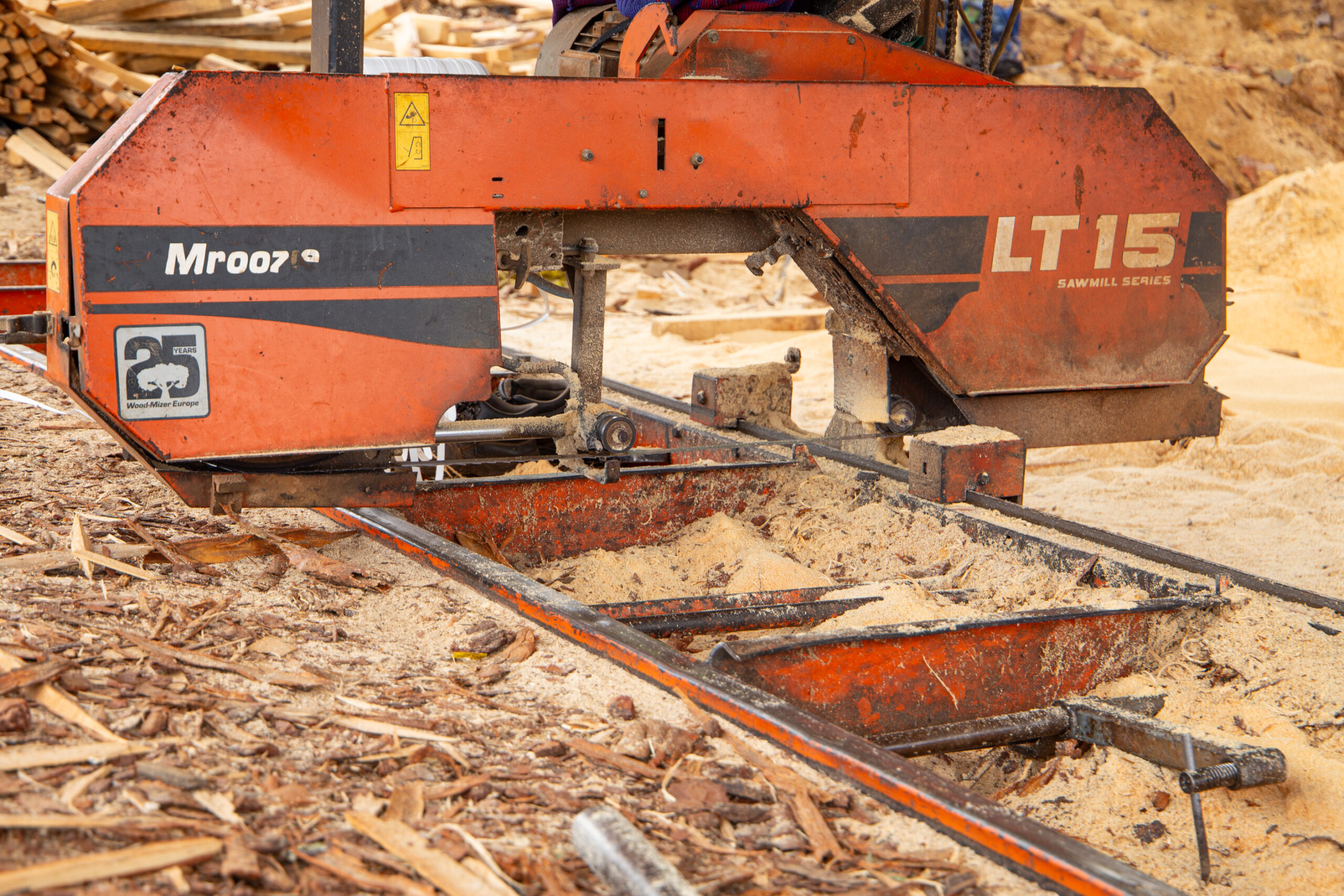The growth of a sawmill from start-up status in 2009 to now supplying major hardware’s across SA’s Limpopo Province shows the potential that sawmilling holds and how emerging sawmillers are positively impacting SA’s economy.
Abraham Mafa is the owner of Pogotla di Kapa Sawmill.
Strategically placed in one of South Africa’s key timber production hubs, Pogotla nestles in the foothills of the Wolkberg or Cloud Mountain range near Tzaneen in the Limpopo Province.
Abraham Mafa’s genesis to Pogotla started with numbers. He excelled in maths and science at school, competing at Olympiads against similarly gifted prodigies with the end-goal medicine, but his farm-worker parents couldn’t afford varsity.
Instead, Abraham joined the multi-national Hans Merensky Holdings Group, which holds interests in timber, sawmilling and fruit.
Working at Northern Timbers Sawmill, management soon recognized Abraham’s ability. Promotions from Operator to Supervisor, Foreman, and eventually Assistant Production Manager underscored his success during the 20 years at the mill.
A sideline timber trading business that Abraham started while working for Northern Timber gave him the opportunity to earn more money, better support his parents, think broader, and start Pogotla.

Abraham Mafa, Pogotla Di Kapa’s MD.
Pogotla kicks off
The thinking was simple – produce sawn timber instead of buying it from suppliers. Stripping out the extra expenses saw the numbers working in Abraham’s favour with a second-hand circular mill and Wood-Mizer LT15 sawmill launching Pogotla in 2007.
A second Wood-Mizer LT15, two Wood-Mizer LX450s, and a Wood-Mizer six-head HR500 Resaw, later split into a two- and four-head setup to improve recovery, underscored Pogotla’s rapid growth.
Pogotla’s initial focus was milled timber for walk-in customers. The accuracy and quality of Pogotla’s sawn product soon quadrupled into supply contracts across the province.
But Abraham had his eye on a larger prize.
He knew Pogotla’s ability to maximize recovery and add value to sawn timber was the gateway to further growth.

A six-head HR500 resaw that was split into a four and two-head unit is the heartbeat of Pogatla’s recovery line.
The six-head Wood-Mizer resaw, later split into a two- and four-head unit, allowed Pogotla to reach its current 75% recovery rate.
With recovery in place, Abraham’s focus then turned to value addition. A broomstick plant failed because it did not meet Pogotla’s cost-to-income targets.
A move to door manufacturing delivered the margins Abraham wanted. Sawn material, plus finger-jointed offcuts and recovered material, are all now plugged into place to deliver a door range that now goes to the largest hardware stores in the area.
The third objective was in-house drying capacity. Wet-off-saw timber that could now be dried allowed Pogotla to dry its timber for structural applications and Pogotla’s manufacturing plant.
A fourth objective was the waste left over after recovery and manufacturing. Offcuts from manufacturing are now chipped and sold to Sonae Arauco’s White River board production plant. Shavings go to chicken and horse farmers in the area, all sold at a profit. Whatever’s left over goes to Pogotla’s kilns to drive the boilers that deliver steam to the kilns.
The current sawn timber output from the mill stands at between 900 and 1200 m3/month. A fleet of 10 trucks distributes Pogotla’s product across the Limpopo Province. The current employee tally is 83, down from 110 due to industry challenges.

Finger jointed material in the making to bolster recovery and produce components for doors manufacturing.
Challenges
“I can easily open a second mill of this size, but I can’t because of the challenges we’re facing,” Abraham says.
“Load shedding is the first. We employ people eight hours a day, but five-hour days forced by load-shedding make it challenging to balance the numbers.
“Obstacles to the source also exist. Commercial growers need to give emerging millers fixed contracts as they do for large sawmills. The higher out-of-contract log prices eat into profits.
“The weather imposes further obstacles to logs supplies.
“When it rains, access to compartments becomes difficult, resulting in sporadic log supplies that play havoc with our production schedules,” Abraham says.

Pogotla’s Wood-Mizer LX450’s
Relationships
“Our relationship with Wood-Mizer is solid,” Abraham continues.
“Wood-Mizer extended very affordable terms to us that allowed for expansion when we were still small. Six and one-year credit terms allowed us to afford expensive technology that’s now the backbone of our business. Regular service calls from Wood-Mizer, plus spares and blades, allow the mill to produce,” Abraham says.

Pogotla’s kilns taking wet-off-saw timber to dry with the end-product sold as structural timber for higher margins with Pogotla’s manufacturing plant also fed from here.
Final take
Pogotla’s success reminds us of the potential of sawmilling and how sawmillers like Abraham Mafa, who come through the ranks, are contributing to SA’s economic growth.
It also underscores the importance of resilience.
Despite his agile mind, circumstances did not allow Abraham to pursue medicine. Instead, he chose not to let disappointment ruin his life but to make his own future.
And what a future it has been!
Growing from a small sawmill to now supplying major hardware’s and across the province sawmills points at Abraham’s grit, determination, fortitude, and sawmilling savvy.
Wood-Mizer saw Abraham and bet on him.

Shavings for board manufacturing completing the loop for maximum wastage and best margins.









